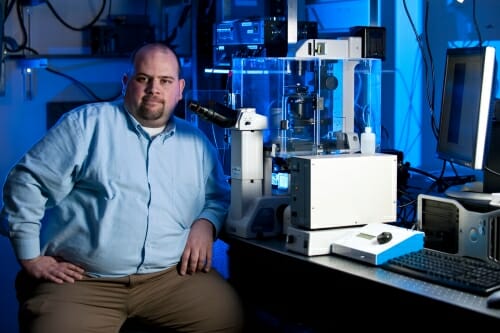Professor will make ‘workhorse’ microscope more powerful
Kevin Eliceiri, professor of medical physics and biomedical engineering at the University of Wisconsin–Madison, plans to improve the architecture and infrastructure of μManager, an open-source software package for control of automated microscopes.
Open-source software is crucial to modern scientific research for advancing biology and medicine while also providing reproducibility and transparency. Yet, even the most widely used research software often lacks dedicated funding.
Now, Eliceiri has received a $200,000 grant for his work from the Chan Zuckerberg Initiative. CZI awarded just 32 grants worldwide for 42 such projects.

Kevin Eliceiri works with a swept-field confocal microscope. “This project is all about making the workhorse known as the microscope more powerful,” says Eliceiri, a principal investigator in the Laboratory for Cell and Molecular Biology.
“This project is all about making the workhorse known as the microscope more powerful,” says Eliceiri, a principal investigator in the Laboratory for Cell and Molecular Biology in the Office of the Vice Chancellor for Research and Graduate Education, associate director of the McPherson Eye Research Institute, and investigator of the Morgridge Institute for Research. “Open-source software not only enables unhindered adoption but importantly free adaptation, taking tools into new directions beyond their original intent.”
Eliceiri uses μManager in his own research, which focuses on biophotonics, or the use of light to investigate biological phenomena, and on the application of computational techniques to analyze and process images of biological processes in real time.
Much of this informatics work entails development of the widely used open-source ImageJ software. μManager heavily relies on ImageJ for its functionality and Eliceiri’s CZI funding will benefit both software packages.
“Software allows you to work with the full lifecycle of data — how you acquire data, visualize it, analyze it — and open-source software is all about accessibility and transparency, allowing scientists to freely try new approaches and understand precisely what was done in a study,” Eliceiri says.
The CZI grant will also lead to enhanced data acquisition using μManager.
“Not only can open-source software save time and resources, but it can directly lead to new innovation and discovery.”
Kevin Eliceiri
“When one thinks of how data is acquired, that often doesn’t get as much attention as data analysis,” Eliceiri says. “I’m interested in optimizing the settings of the microscope and improving how the hardware are talking to each other.”
Eliceiri is using these tools to understand the role that the environment within a cell plays in disease progression.
“Optical imaging is the tool of choice for understanding cellular phenomena with precise spatial and temporal accuracy,” he adds.
Eliceiri says he has always believed that science is best done by building on the work of others and openly sharing what you have done.
“Open-source software is the very embodiment of this concept,” he says. “Not only can open-source software save time and resources, but it can directly lead to new innovation and discovery.”
Founded by Dr. Priscilla Chan and Mark Zuckerberg in 2015, CZI leverages technology to help solve some of the world’s toughest challenges, from eradicating disease to improving education and reforming the criminal justice system.
Other CZI funded projects include tools for visualizing, analyzing and managing data for research areas such as genomics, structural biology, cell biology, neuroscience and more.




